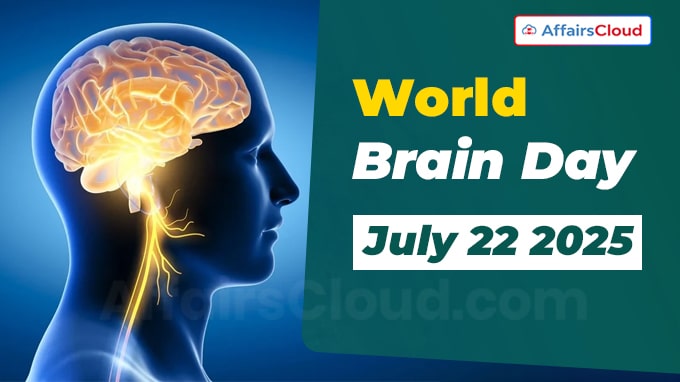 World Brain Day (WBD) is observed annually across the globe on July 22 to raise awareness about the importance of brain health and neurological disorders.
World Brain Day (WBD) is observed annually across the globe on July 22 to raise awareness about the importance of brain health and neurological disorders.
- World Federation of Neurology (WFN) based in London (United Kingdom, UK) , leads the initiative in collaboration with the World Health Organization (WHO) and United Nations Economic and Social Council (UN ECOSOC).
- July 22, 2025, marks the observance of the 12th edition of WBD.
Theme:
The theme for WBD 2025 is “Brain Health for All Ages”, highlights the importance of brain health from pre-conception to old age.
- It aligns with the Intersectoral Global Action Plan (IGAP) for Epilepsy and Other Neurological Disorders (2022–2031) and the United Nations(UN) Sustainable Development Goals (SDGs).
Background:
i.The idea of observing “WBD” was first proposed by the Public Awareness and Advocacy Committee (PAAC) of the WFN during the Council of Delegates meeting at the World Congress of Neurology (WCN) in September 2013, held in Vienna, Austria.
ii.The proposal received formal approval from the WFN Board of Trustees in February 2014, establishing it as an annual event.
iii. Following this, WBD was officially initiated by the WFN in 2014 to be observed every year on July 22.
Why 22 July?
i.The date 22 July commemorates the founding of the WFN in 1957 in Brussels, Belgium.
ii.It also marks the day the WFN’s first constitution was formulated, symbolizing a historic milestone in global neurological collaboration.
Five Key Action Areas of WBD 2025
i.Awareness: Combat stigma and promote early diagnosis of neurological disorders, which affect 1 in 3 people globally and cause 9 million deaths/year
ii.Education: Equip healthcare professionals and the public with science-based brain health strategies.
iii.Prevention: Implement evidence-based measures like Nutrition and vaccination in early childhood, and Hypertension control and lifestyle modifications in adulthood
iv.Access to Care: Bridge global inequities in low-income countries, having only 3 neurologists per 10 million people, while 480 in high-income nations
v.Advocacy: Increase funding and policy support to reduce neurological disabilities, which account for 70% of global DALYs (Disability-Adjusted Life Year).
Key fact:
i.Optimizing brain health could prevent 80% of strokes and 40% of dementia cases through primary interventions.
ii.A research report from India showed that non-communicable and injury-related brain disorders more than doubled in the country between 1990 and 2019, possibly because of the rise in the elderly population.
- Among these conditions, stroke was the most common (37.9%), followed by headaches like migraines and tension-type headaches (17.5%), and epilepsy (11.3%).
About World Federation of Neurology (WFN):
President- Professor Wolfgang Grisold
Headquarters- London, the United Kingdom (UK)
Established – 1957




